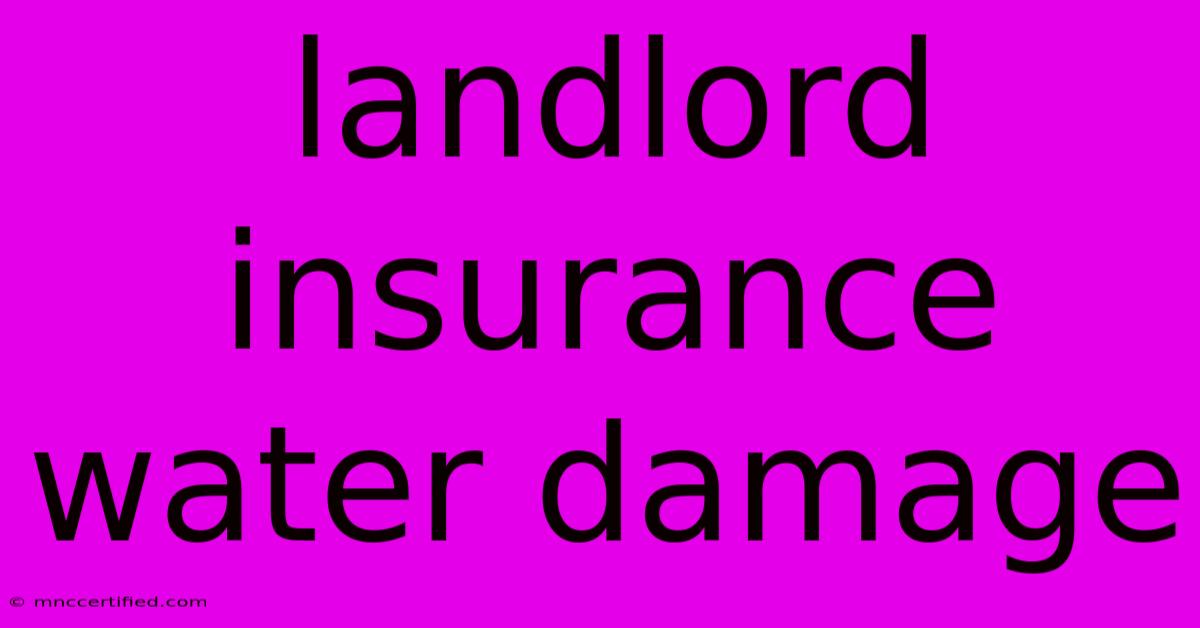Landlord Insurance Water Damage

Table of Contents
Landlord Insurance: Protecting Your Investment Against Water Damage
Water damage. Just the phrase conjures images of soggy drywall, warped floors, and the hefty repair bills that follow. For landlords, this isn't just a homeowner's headache; it's a potentially devastating financial blow. This is why understanding landlord insurance and its coverage for water damage is crucial for protecting your investment property and your financial well-being.
Understanding the Risks of Water Damage to Rental Properties
Water damage in rental properties can stem from various sources, each posing unique challenges:
- Plumbing Failures: Burst pipes, leaky faucets, and malfunctioning toilets are common culprits. These can lead to significant damage if left undetected.
- Appliance Malfunctions: Washing machines, dishwashers, and refrigerators can all spring leaks, often causing extensive damage before the problem is discovered.
- Roof Leaks: A damaged roof, especially during heavy rains or storms, can lead to widespread water damage, affecting ceilings, walls, and insulation.
- Sewage Backups: This is a particularly nasty scenario, often requiring extensive remediation and potentially impacting the health and safety of tenants.
- Natural Disasters: Flooding from hurricanes, severe thunderstorms, or melting snow can cause catastrophic water damage, potentially rendering the property uninhabitable.
Landlord Insurance: Your Shield Against Water Damage Costs
Standard homeowner's insurance policies generally won't suffice for rental properties. Landlord insurance, also known as rental property insurance, is specifically designed to cover the unique risks associated with owning and managing rental units. Crucially, it typically includes coverage for water damage, but the specifics vary widely depending on your policy and provider.
What Does Landlord Insurance Cover Regarding Water Damage?
A comprehensive landlord insurance policy covering water damage usually includes:
- Repair Costs: This covers the cost of repairing or replacing damaged structures, appliances, and personal property belonging to the landlord (not the tenant's belongings).
- Emergency Services: Coverage may extend to emergency services like plumbers or water mitigation specialists to quickly address the damage and prevent further losses.
- Loss of Rental Income: If the property becomes uninhabitable due to water damage, the policy may cover lost rental income while repairs are underway. This is particularly helpful in minimizing financial disruption.
- Liability Protection: If a tenant is injured due to water damage caused by a negligent act on your part, liability protection will cover legal fees and settlements.
What Landlord Insurance Typically Doesn't Cover
It's vital to understand the limitations of your policy. Landlord insurance usually excludes:
- Tenant's Belongings: Tenant's personal property is typically not covered under your landlord insurance. Encourage tenants to secure renter's insurance.
- Pre-existing Conditions: Damage caused by pre-existing conditions, like a known leak that wasn't addressed before the policy started, might not be covered.
- Flood Damage (Usually): Flood insurance is typically a separate policy. Check if your policy includes flood coverage or if you need a supplemental flood insurance policy, especially in flood-prone areas.
- Neglect or Intentional Damage: Damage caused by your willful neglect or intentional actions will not be covered.
Choosing the Right Landlord Insurance Policy
Selecting the right landlord insurance policy requires careful consideration. Here's what to focus on:
- Coverage Limits: Ensure your policy's coverage limits are sufficient to cover the potential cost of repairing or rebuilding your property in case of extensive water damage.
- Deductibles: Understand your deductible, as this is the amount you'll pay out-of-pocket before the insurance coverage kicks in.
- Policy Exclusions: Carefully review the policy exclusions to understand what isn't covered.
- Multiple Properties: If you own multiple rental properties, you might need a different policy than if you only own one.
- Insurance Provider Reputation: Choose a reputable insurance provider with a proven track record of handling claims fairly and efficiently.
Proactive Measures: While insurance is essential, proactive maintenance can significantly reduce the risk of water damage. Regular inspections, timely repairs, and educating tenants on water conservation can minimize potential problems.
Conclusion: Protecting Your Investment is Paramount
Landlord insurance, particularly with robust water damage coverage, is a non-negotiable expense for any responsible property owner. It safeguards your financial investment and peace of mind, protecting you from the potentially devastating costs associated with water damage. By understanding your policy's coverage, limitations, and proactively mitigating risks, you can effectively protect your rental property and ensure its long-term value. Remember, a well-chosen landlord insurance policy is a crucial investment in the future of your rental property business.

Thank you for visiting our website wich cover about Landlord Insurance Water Damage. We hope the information provided has been useful to you. Feel free to contact us if you have any questions or need further assistance. See you next time and dont miss to bookmark.
Featured Posts
-
51 Year Old Dan Hurley Pre Game Free Throws
Nov 26, 2024
-
401k And Real Estate Investment
Nov 26, 2024
-
Fetch Vs Lemonade Pet Insurance
Nov 26, 2024
-
Is Microsoft 365 Down Check Now
Nov 26, 2024
-
Valley Events This Week Top Picks
Nov 26, 2024